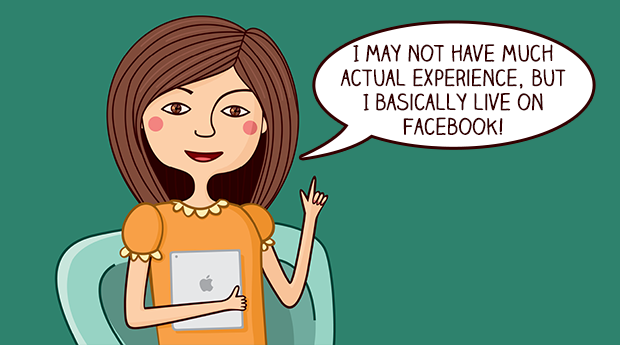Social Media is a Canvas, Not a Skill

Most of the resumes we receive include social media as a skill. And when we bring these applicants in for interviews, they are eager to tell us about their passion for it. Many of them have held prior internships or positions where using social media was a key part of their roles, and they see it as a main component of their future careers. They love social. They understand its importance in digital marketing. They’ve been using it for much of their lives.
We like seeing the enthusiasm for social (after all, it’s a big part of what we do at Nebo), but after a while, it starts to sound like a broken record. Everyone enjoys social, and everyone believes they are good at it. What does this really mean? Is this an area of expertise? What makes one person better at it than another? How can an aspiring social media marketer distinguish herself among a sea of applicants who share the same “skill”?
The key thing to remember is that social is not a skill. It’s a medium, like any other digital tool. When we say someone is good at digital marketing, we don’t mean they are good at the internet – we mean they are good at applying their core marketing strengths to the digital medium. Social is exactly the same.
There is a huge difference between a self-proclaimed social media “guru” who has sporadically tweeted from his company’s handle and a specialist who has conducted social audits, analyzed competitors’ efforts, developed a strategy, created an editorial calendar and actively managed a community. Technically speaking, both have experience in social. What sets these people apart is their knowledge of marketing and how they’ve used the social medium to demonstrate true skills, including:
- Research – Any marketing strategy should be grounded on thorough research. Social provides a unique challenge, as there are hundreds of tools for collecting and measuring social data, and none of them are perfect. We need to understand which combination of resources will provide the most meaning and value for clients. And we need to use that data to tell stories, tap into relevant conversations, identify trends and generate actionable insights.
- Communication – This requires knowing the culture and best practices for each social platform, as well as monitoring and staying active among relevant communities. Social isn’t about reaching as many people as possible, but reaching the right people with the right content. A novice social media marketer might strive to create “viral” content, but a practiced professional knows that building long-term relationships is more valuable. Marketers need to understand how specific audiences consume, interpret and disperse messages so that they can find a way to add value to those conversations.
- Copywriting – Every brand has a different voice and character to express. A skilled copywriter can easily adopt and switch between tones as needed for each audience. And social moves at such a fast pace that being able to produce concise, clear and compelling writing is an indispensable skill.
- Editing – Being a great editor is not just about fixing grammatical mistakes or spelling errors. It’s about understanding how all the pieces work together to tell a story. Each piece of social content needs to be strong on its own, and it also needs to function as part of a larger brand narrative. Aspiring social marketers should be able to develop editorial schedules that have planned, polished and cohesive material for each channel.
- Design – Social is highly visual, and having a basic understanding of color, typography, photography and photo editing is a major advantage. This is more than taking a picture on an iPhone and slapping on an Instagram filter. At the very least, social marketers should be able to provide interesting, quality open source or stock imagery for posts. And anyone who can go the extra mile to produce original images has a serious leg up on the competition.
Ultimately, we must keep in mind that social is a creative tool. Each platform is only a canvas that allows us to show our true talents. If you want to stand out as an expert in social media, focus less on the platforms themselves and more on the enduring strengths that any great marketer has. Polish the skills above and use them as differentiators in your projects, resume and interviews. Then, you’ll be ready for Facebook, Pinterest or whatever medium comes next.
Comments
Add A CommentAs usual, a great read, and I found myself asking another question: When it comes to "being good at social" which starts to sound so boring, if you ask me, how exactly are these experts measuring that? Number of followers? Number of likes? I'm not sure those numbers hold weight. A great read here as you dive into what matters, and what makes someone "good" at social.
Agree. The ability to add value to your conversations, and to aim them in an attractive way to the appropriate audience.